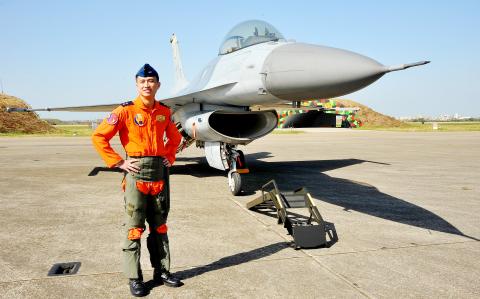US-based media reported on Thursday that the US government had privately decided to sell a new arms package to Taiwan, but was keeping it under wraps until after an official delegation by Chinese President Hu Jintao (胡錦濤) visits next week.
Quoting unnamed senior US government officials, the Washington Times said the package would include new upgrades for Taiwan’s aging arsenal of US-made F-16A/Bs and it is expected to trigger fresh outrage from Beijing.
In Taiwan, the Ministry of National Defense and the Air Force would neither confirm nor deny the information, with officials saying they had yet to learn of the content of the reports.

PHOTO: LIU HSIN-DE, TAIPEI TIMES
In recent years, Taiwan has made repeated requests for purchases of F-16C/D aircraft from the US, saying the fighters were necessary to ensure balance in the Taiwan Strait following reports of China’s development and testing of fourth and fifth-generation fighter aircraft, including the Chengdu J-20 stealth fighter.
The prototype plane — China’s first radar-eluding stealth fighter, seen as match for the US’ F-22 — reportedly made its first test flight on Wednesday. Experts said that when operational, the fighter would likely overwhelm Taiwanese defense capabilities.
The Washington Times reported that while Taiwan’s request for F-16C/Ds was still being considered, the upgrade package, which would provide the existing fleet with new electronics, engines and missiles, had already been secured.
Other elements of the arms package could include new radar, possibly the advanced Active Electronically Scanned Array system and AIM-9X air-to-air missiles, the report said.
Time is running short for the new F-16 request. US lawmakers who support their inclusion have said that F-16 production lines are expected to close soon, possibly later this year, and are unlikely to be reopened.
The news comes at a sensitive time for US-China relations, with Hu expected to meet US President Barack Obama at the White House on Wednesday. Beijing cut military exchanges after a previous arms deal last year and imposed sanctions on US firms involved in the deal.
One of the aims of US Secretary of Defense Robert Gates’ three-day visit to Beijing earlier this week was to reactivate military exchanges between the US and China.
At a joint press conference on Monday, Chinese Defense Minister Liang Guanglie (梁光烈) said the US should halt future arms sales to Taiwan, as they “jeopardized China’s core interests.”
Reports said Gates later told reporters he did not believe the US’ arms sales policy toward Taiwan would change anytime soon.
Chinese Nationalist Party (KMT) Legislator Lin Yu-fang (林郁方), a member of the legislature’s Foreign and National Defense Committee, said that based on recent meetings with US government officials, the upgrade package for the F-16s could materialize “soon,” adding that the deal was likelier to materialize than the sale of new F-16C/Ds.
Under the US’ Taiwan Relations Act, the US is obliged to provide Taiwan with defensive weapons, although sales of major hardware, including fighter aircraft, have become less frequent in recent years.
Most of Taiwan’s arsenal of Air Force fighters other than the F-16A/Bs could be retired by 2025, with F-5E/Fs scheduled to be decommissioned between 2014 and 2017.

ENDEAVOR MANTA: The ship is programmed to automatically return to its designated home port and would self-destruct if seized by another party The Endeavor Manta, Taiwan’s first military-specification uncrewed surface vehicle (USV) tailor-made to operate in the Taiwan Strait in a bid to bolster the nation’s asymmetric combat capabilities made its first appearance at Kaohsiung’s Singda Harbor yesterday. Taking inspiration from Ukraine’s navy, which is using USVs to force Russia’s Black Sea fleet to take shelter within its own ports, CSBC Taiwan (台灣國際造船) established a research and development unit on USVs last year, CSBC chairman Huang Cheng-hung (黃正弘) said. With the exception of the satellite guidance system and the outboard motors — which were purchased from foreign companies that were not affiliated with Chinese-funded

PERMIT REVOKED: The influencer at a news conference said the National Immigration Agency was infringing on human rights and persecuting Chinese spouses Chinese influencer “Yaya in Taiwan” (亞亞在台灣) yesterday evening voluntarily left Taiwan, despite saying yesterday morning that she had “no intention” of leaving after her residence permit was revoked over her comments on Taiwan being “unified” with China by military force. The Ministry of the Interior yesterday had said that it could forcibly deport the influencer at midnight, but was considering taking a more flexible approach and beginning procedures this morning. The influencer, whose given name is Liu Zhenya (劉振亞), departed on a 8:45pm flight from Taipei International Airport (Songshan airport) to Fuzhou, China. Liu held a news conference at the airport at 7pm,

Taiwan was ranked the fourth-safest country in the world with a score of 82.9, trailing only Andorra, the United Arab Emirates and Qatar in Numbeo’s Safety Index by Country report. Taiwan’s score improved by 0.1 points compared with last year’s mid-year report, which had Taiwan fourth with a score of 82.8. However, both scores were lower than in last year’s first review, when Taiwan scored 83.3, and are a long way from when Taiwan was named the second-safest country in the world in 2021, scoring 84.8. Taiwan ranked higher than Singapore in ninth with a score of 77.4 and Japan in 10th with

Authorities yesterday elaborated on the rules governing Employment Gold Cards after a US cardholder was barred from entering Taiwan for six years after working without a permit during a 2023 visit. American YouTuber LeLe Farley was barred after already being approved for an Employment Gold Card, he said in a video published on his channel on Saturday. Farley, who has more than 420,000 subscribers on his YouTube channel, was approved for his Gold Card last month, but was told at a check-in counter at the Los Angeles International Airport that he could not enter Taiwan. That was because he previously participated in two